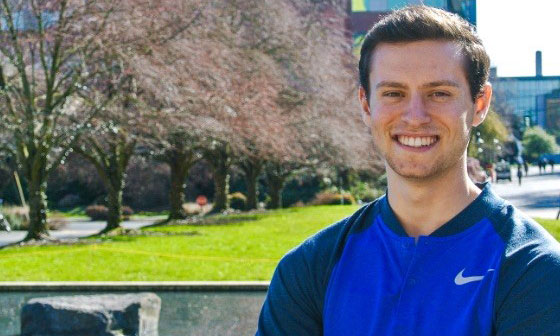
Jesse Goncalves
Work Outside the Classroom Connects Academics and Service Values

“So much of what I learn in class is not explicitly tied to its application for social good, and that is some-thing that I really want to focus on,” says math major Jesse Goncalves, ’19. As a Bannan Scholar engaged in community-based projects, he is acutely aware of his peers’ often unrealized potential to apply and contextualize their learning through projects in the community.
Jesse had an idea: What if a group of creative, highly motivated students were to collaborate on projects of particular importance to the community? That idea became Impactathon, an interdisciplinary problem-solving session focused on issues that ranged from designing new educational spaces for public schools to community health programs and a local urban farm.
Jesse and his classmates Dominic Burgi, Brian Le, TudiLe, Oliver Tufte, Ben Viehoff and Jared Mead spent last summer in planning mode. Jesse met with representatives from local nonprofits, asking about their projects and inviting them to participate in the Impactathon. Faculty and staff from the College of Science and Engineering and the Center for Community Engagement served as advisors for the student-led event.
Then, in early September, 50 students from across the university spent 36 hours collaborating on projects proposed by seven community partners.
“What appealed to me was working collaboratively across disciplines with people we rarely get the opportunity to see in class, combining all our skills to positively engage with our community,” says Tudi Le, ’19, a cell and molecular biology major.
The experience was a joyful one for civil engineering major Jorge Lara Alvarado, ’20, who applied what he calls “mindful engineering” to a multidisciplinary team project for the Black Farmers Collective. “I have been looking for ways to give back to my community,” he says. “It is important to use my engineering knowledge and also exercise sensitivity to the needs of the community members.”
Physics major Camille Zaug, ’20, helped design a nutrition empowerment program for Lifelong, an organization serving individuals with HIV and AIDS. Camille addressed the task the way she approaches a research problem. “You have to think critically. Is your solution feasible? Does it make sense for the community?” she says.
Participating organizations—including Lifelong and the Black Farmers Collective—are putting the students’ ideas to use as they move forward with their projects. And looking ahead, the students intend to expand the scope of the Impactathon, increasing participation from students majoring in business, communications and design and welcoming an even greater number of community partners to the event.